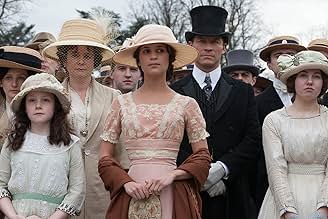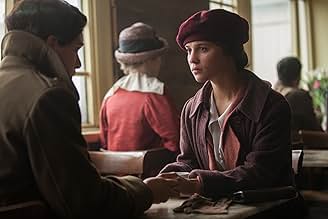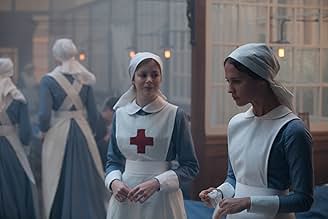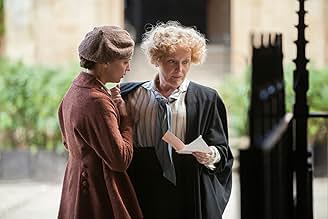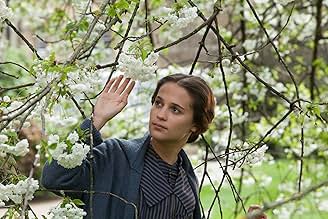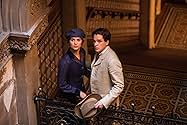Una mujer británica recuerda cumplir los 18 durante la Primera Guerra Mundial: una historia de amor juvenil, y sobre cómo dar sentido a la vida a sus tiempos más oscuros.Una mujer británica recuerda cumplir los 18 durante la Primera Guerra Mundial: una historia de amor juvenil, y sobre cómo dar sentido a la vida a sus tiempos más oscuros.Una mujer británica recuerda cumplir los 18 durante la Primera Guerra Mundial: una historia de amor juvenil, y sobre cómo dar sentido a la vida a sus tiempos más oscuros.
- Dirección
- Guionistas
- Elenco
- Premios
- 5 premios ganados y 7 nominaciones en total
- Dirección
- Guionistas
- Todo el elenco y el equipo
- Producción, taquilla y más en IMDbPro
Opiniones destacadas
One of the things that determines Testament of Youth different to other bloody, explosive and bullet-ridden war tales is that it is focused on the domestic view of the ones who not only joined the war on the front-line, but also those at home and the consequent effects on loved ones, offering an unseen perspective, and solid-account of the despair that war causes.
Beginning in pre-war 1914, we are introduced to Vera Brittain, a determined and wilful individual with aspirations of not becoming just a traditional young-married women, but one who attends Oxford University and chooses her own life-choices.
Along with her brother Edward (Taron Egerton) and his two friends Victor (Colin Morgan) and Geoffrey (Jonathan Bailey), they all enjoy their youth in the rural village with their parents (Dominic West and Emily Fox). On-the-road to Oxford, she is introduced to her brothers close friend Roland (Kit Harington), and a relationship soon breaks out - but untimely, as does the war.
Quite proud to do so out of loyalty to Queen and country, her brother Edward, and friends Victor and Geoffrey with Roland all sign up to the forces to assist. (Against parental wishes to do so). Now at Oxford, yet unable to focus as this devastation is happening all around her, she joins the forces too, as a nurse - and the film develops from there.
Given a world-premiere at the 58th BFI London Film Festival, the film is squeezed out in time for the Remembrance holidays and by-all accounts award season. Based on our criticism alone, it is going to be praised and remembered at both.
Crafted by former TV-movie director, James Kent, along with the (brilliant) cast, Testament of Youth is a thoroughly engaging history drama in Downton Abbey-esqe war times and a unique approach to the war like never before.
As such, I had extremely high expectations for this film, and was skeptical that Alicia Vikander and Kit Harington would be "my" Vera and Roland--I had such a fixed idea of them in my head. Fortunately Alicia and Kit's performances met my expectations. They had wonderful chemistry and the relationship as portrayed captured the essence of Vera and Roland: the intelligent, witty banter, sweet/innocent flirtatiousness, passion and angst. This relationship is at the heart of the memoir and is the driving force for much of what occurs during and after its commencement, so it was very important for this relationship to be portrayed accurately and to be emotionally moving for the audience, which it certainly was for me.
Supporting characters played by Taron Egerton (Edward) and Colin Morgan (Victor) were also wonderfully portrayed, which was a relief as the relationships with her brother and friend are extremely important in the memoir as well, and just as emotionally moving as the romance between Vera and Roland. As far as the other aspects of the film are concerned, the stirring scenes at the hospital where Vera volunteers as a nurse are gripping and faithfully portray the tumultuous wartime experiences that Vera describes in her memoir.
The highlight for me was the poetry of Roland which is interwoven during key moments in the film. This is a lovely element to the story that I found very touching and it provides a beautiful, emotional backdrop for key scenes.
I really hope this film spurs those who haven't read the memoir/have never heard of Vera Brittain to go on and read "Testament of Youth." The book certainly lingered in my mind for quite some time after I had first read it, and the film likewise recaptured those feelings for me.
Young Vera is headstrong, not only about wanting to make her own way in a man's world (female emancipation was still years away), but later about making her own contribution to the war effort by enrolling as a nurse while her lover, brother and other male friends are fighting in the trenches. Told wholly from her point of view, it's an entertaining if not enthralling watch, beautifully shot and well acted if somehow just lacking some extra pathos to really capture the hellish undertow of the War to end all Wars.
Alicia Vikander is appealing as the vaguely tomboyish, intellectual Vera. In those days, it would appear, the golden youth had to be chaperoned everywhere by a usually imposing maiden aunt figure and make their feelings about each other known by writing and sending poems as the film strives to contrast the idyllic pre-war days of carefree swimming and carousing with the bleakness and destruction of war itself. For me, I didn't feel the contrast quite sharply enough and my abiding memories of the film are of the big family house and the dreaming spires of Oxford rather than the hell of the makeshift military hospitals and muddy and bloody trenches on the front line.
The best shot for me was when I perhaps detected a tribute to all-time great movie "Gone With The Wind" as Vera goes Scarlett-like amongst the wounded and dying, searching for her wounded brother where the camera ascends into a sweeping dolly shot showing the full extent of the number of the casualties, just like Vincent Fleming's rightly famous take all those years ago.
The supporting actors are picked from the familiar directory of experienced British character actors, notably Miranda Richardson and Emily Watson, while the young actors in the leads, all of them unfamiliar to me, perform with aplomb.
There is a great true-life story to be told here and this film does so respectfully and responsibly, if just a little too carefully at times.
The camera may seem to dwell too much on idyllic country scenes and beautiful vistas at the expense of plot and character, though that does help to heighten the contrast between Vera's privileged but restricted prewar life and the new life of purpose and endless horror that awaits her at a field hospital in France. The camera's used most effectively when the two worlds collide-to illustrate Roland's poem addressed to the corpse of a German soldier found lying in a patch of wildflowers, most of all in the panorama of a boundless field of dead and dying men surrounding the hospital after a "big push" (which echoes the famous crane shot after the Battle of Atlanta in "Gone with the Wind"). I'll let the nitpickers figure out if the Leightons' house on the South Coast really did have a magnificent view of what looks like the White Cliffs of Dover, but the stormy shoreline makes the perfect backdrop for a scene in which Roland returns angry and shellshocked from the front
The basic storyline-Vera's service in France and her romance with Roland Leighton-is skillfully dramatized and very moving; her struggle with the conventions of Georgian family life is somewhat less involving, one exception being an ironic episode in which she's summoned back from the front to deal with a family "crisis," only to find that her mother's gotten sick and has fallen behind with the housework
The much-praised '79 series with Cheryl Campbell only seems to be available on VHS and Region 2 DVD; I wouldn't hesitate in recommending this gorgeous and affecting new version as an alternative.
¿Sabías que…?
- TriviaSaoirse Ronan was originally cast as Vera Brittain but she dropped out due to scheduling conflicts. Alicia Vikander replaced her.
- ErroresAs Roland and Vera meet in late 1914 before he leaves for France, Aunt Belle notices that Roland is sick and she talks about how influenza is ripping through the troops and it's in all the newspapers "Spanish Influenza they call it." The earliest known case of what would only later be called the Spanish flu was in March of 1918--and reports of the plague were zealously suppressed in the press of the belligerent nations for fear that it damaged morale. The only reason the disease, which actually was first documented in Kansas, was named "Spanish Flu", was because Spain was neutral in the war and the Spanish papers were free to report cases, giving the wrong impression elsewhere that Spain was hit first and harder by the disease.
- Citas
Roland Leighton: Down the long white road we walked together. Down between the grey hills and the heather. You seemed all brown and soft, just like linnet. Your errant hair had shadowed sunbeams in it. And there shone all April in your eyes.
- Créditos curiososDuring the opening credits, World War I guns can be heard in the background.
- ConexionesFeatured in Film '72: Episode #44.1 (2015)
- Bandas sonorasSilver Threads Among the Gold
Written by H.P. Danks & Eben E. Rexford
Performed by John McCormack
Source: Library and Archives
Canada/Silver Threads Among the Gold
1922/AMICUS 31399658
Selecciones populares
- How long is Testament of Youth?Con tecnología de Alexa
Detalles
- Fecha de lanzamiento
- Países de origen
- Sitios oficiales
- Idiomas
- También se conoce como
- Testament of Youth
- Locaciones de filmación
- Productoras
- Ver más créditos de la compañía en IMDbPro
Taquilla
- Total en EE. UU. y Canadá
- USD 1,822,250
- Fin de semana de estreno en EE. UU. y Canadá
- USD 53,000
- 7 jun 2015
- Total a nivel mundial
- USD 5,851,758
- Tiempo de ejecución
- 2h 9min(129 min)
- Color
- Mezcla de sonido
- Relación de aspecto
- 2.39 : 1







